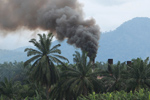
Rainforest in Sumatra, Indonesia
Opening a climate summit in Jakarta, former U.S. Vice President Al Gore thanked Indonesian President Susilo Bambang Yudhoyono for his commitment to reduce projected greenhouse gas emissions, reports the Jakarta Globe.
“I would like to say a special word of thanks to the president of Indonesia, President Yudhoyono, because of his courage and vision and leadership on the issue that we are here to discuss and work on,” the Jakarta Globe quoted Gore as saying.
“He spoke out at a time when no other leader of a G-77 nation was willing to stand up and take the initiative and break the mold, thus breaking a longstanding deadlock that had frustrated progress in some areas that are now amenable to some progress,” Gore said, alluding to Yudhoyono’s pledge to reduce greenhouse gas emissions 26-41 percent from projected levels.
“I respect him bravely and admire his leadership and I know that the historic pledge that he made on the eve of Copenhagen is going to continue to bring great things to the world and to Indonesia.”
Gore spoke to hundreds of participants of the summit, which was organized by The Climate Project, a group the former Vice President founded to raise awareness about climate change.
Gore said that Indonesia’s peatland and forests provide a great opportunity to reduce carbon emissions.
“There are high impact mitigation efforts, such as stopping the use of fires for land clearing and rehabilitation of previously opened peatlands, which recognize the long-term economic value that greatly outweighs the benefits from continuing unsustainable and high greenhouse-gas emitting activities.”
Gore’s comments comes as Indonesia works to implement a moratorium on new logging and plantation concessions in peatlands and forest areas. The moratorium, which is part of a $1 billion agreement signed last May with Norway, was supposed to take effect January 1 but has been held up by legal wrangling. The impasse is expected is be addressed soon, according to a government official who spoke on the condition of anonymity.
Related articles
Indonesia delays logging moratorium
(01/05/2011) Bureaucratic confusion has led Indonesia to delay implementation of its two-year moratorium on new logging and plantation concessions in forest areas and peatlands, reports the Jakarta Globe.
Borneo province selected for Indonesia’s first pilot under REDD program

(12/30/2010) Indonesian President Susilo Bambang Yudhoyono has selected Central Kalimantan as the pilot province for the country’s Reducing Emissions from Deforestation and Forest Degradation (REDD+) program, according to the President’s office on climate change. Central Kalimantan was selected over eight other forested provinces, including Aceh, Jambi, Riau, and South Sumatra on the island of Sumatra; West Kalimantan and East Kalimantan on the island of Borneo; and Papua and West Papua in Indonesian New Guinea. Central Kalimantan was chosen due to its high rate of forest conversion, large expanses of peatlands and rainforests, the advanced state of carbon conservation test projects, and political interest in reducing deforestation and degradation.
Will Indonesia’s big REDD rainforest deal work?

(12/28/2010) Flying in a plane over the Indonesian half of the island of New Guinea, rainforest stretches like a sea of green, broken only by rugged mountain ranges and winding rivers. The broccoli-like canopy shows little sign of human influence. But as you near Jayapura, the provincial capital of Papua, the tree cover becomes patchier—a sign of logging—and red scars from mining appear before giving way to the monotonous dark green of oil palm plantations and finally grasslands and urban areas. The scene is not unique to Indonesian New Guinea; it has been repeated across the world’s largest archipelago for decades, partly a consequence of agricultural expansion by small farmers, but increasingly a product of extractive industries, especially the logging, plantation, and mining sectors. Papua, in fact, is Indonesia’s last frontier and therefore represents two diverging options for the country’s development path: continued deforestation and degradation of forests under a business-as-usual approach or a shift toward a fundamentally different and unproven model based on greater transparency and careful stewardship of its forest resources.